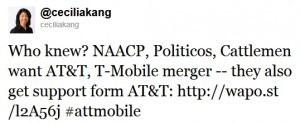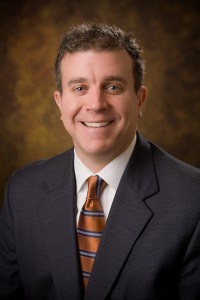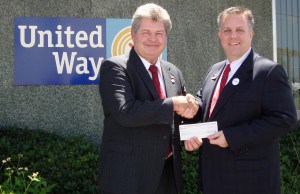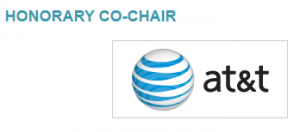 A major scandal in one of the nation’s most important gay civil rights organizations has inadvertently exposed AT&T’s public policy skunkworks — a dollar-a-holler operation to advocate for the company’s merger with T-Mobile, complete with pre-written advocacy letters, traded favors and promises of support from other board members, paid for with big financial contributions.
A major scandal in one of the nation’s most important gay civil rights organizations has inadvertently exposed AT&T’s public policy skunkworks — a dollar-a-holler operation to advocate for the company’s merger with T-Mobile, complete with pre-written advocacy letters, traded favors and promises of support from other board members, paid for with big financial contributions.
When it was all over, the president of Gay & Lesbian Alliance Against Defamation (GLAAD) resigned, his ties to a Republican operative board member connected with AT&T were exposed, and the progressive gay and lesbian media outed the whole sordid affair — painting one of the clearest pictures yet of how civil rights groups get into the unenviable position of trading their good name for a piece of big business action.
As Stop the Cap! has reported for nearly three years now, there is a cottage industry in the non-profit sector collecting favors and contributions in return for letters on organization letterhead supporting the public policy agendas of their corporate sponsors. Honest non-profit groups won’t engage on issues that have little or no connection to their mission statements, but other groups have relaxed those standards to meet fundraising goals or to deal with internal board politics.
 The latter appears to be the most prominent reason for GLAAD’s poorly managed entry into the debate on Net Neutrality and AT&T’s merger targets — the first time the group has ever spoken up about a corporate merger. Because so many in the gay, lesbian, and transgendered community are politically aware, it came as quite a shock when GLAAD suddenly dove into two issues most assumed were not relevant to the group’s mission:
The latter appears to be the most prominent reason for GLAAD’s poorly managed entry into the debate on Net Neutrality and AT&T’s merger targets — the first time the group has ever spoken up about a corporate merger. Because so many in the gay, lesbian, and transgendered community are politically aware, it came as quite a shock when GLAAD suddenly dove into two issues most assumed were not relevant to the group’s mission:
GLAAD Net Neutrality Intrigue: On January 4, 2010, GLAAD President Jarrett Barrios signed a letter to the Federal Communications Commission expressing “concern” about the implementation of formal protection of the open Internet through Net Neutrality. At the time, nothing about Barrios’ letter seemed suspicious. In fact, it was typical of the type and tone of concern trolling by certain groups that could pay a stiff price if rank and file members ever found out. But several members did and raised hell with GLAAD’s leadership over the issue. Barrios evidently panicked, quickly sending a follow-up letter to the FCC claiming his signature was forged and begging the ‘fake’ submission be withdrawn. Ironically, he added the views in the original letter, unclear as they were, did not represent GLAAD’s position on Net Neutrality, whatever it was.
GLAAD Loves AT&T and T-Mobile’s Merger: On May 31st, Barrios joined the National Gay & Lesbian Chamber of Commerce in penning a joint letter advocating the merger because, apparently, gay people love 4G, artistic use of the Internet, and telemedicine. Gay groups immediately pounced, some describing the letter bizarre, others potentially offensive. The second letter ignited an all-out firestorm against GLAAD’s leadership, particularly considering AT&T has donated profusely to GLAAD over the years, and gay people have no more love towards AT&T and its business agenda than anyone else.
Head scratching over why GLAAD was obsessed with delivering a helping hand to AT&T was soon followed by detailed investigations which began to uncover the important underlying facts.
One pivotal moment came from Michelangelo Signorile, a long-time gay activist and radio talk show host, who interviewed GLAAD’s former board co-chair, Laurie Perper. Perper left GLAAD suggesting its board was in turmoil under the leadership of Barrios. In her words, Barrios’ efforts to shore up his presidency included trading an AT&T advocacy letter for a company-connected board member’s continued support.
Perper also dismissed Barrios’ suggestion that the letter to the FCC about Net Neutrality was forged. Instead, she claims, Barrios tried to blame it on his administrative assistant, Jeanne Christiano, who he claimed ambitiously sent the letter without his authorization.
Former GLAAD board co-chair Laurie Perper talks with Michelangelo Signorile about the connection between AT&T and GLAAD’s president. June 7, 2011. (11 minutes)
You must remain on this page to hear the clip, or you can download the clip and listen later.
Since that interview, Barrios’ has come clean about who wrote the Net Neutrality letter. According to Barrios, AT&T sent the talking points to include in the letter and he authorized it:
The letter’s origins lay with AT&T; the telecom giant sent Barrios suggested wording for another letter to the FCC. Barrios’ special assistant used the language verbatim to create the letter, signed his name to it, and sent it in.
Barrios recounts that he was at an airport when his assistant called him to go through some items on his agenda. In a hurry to board his plane, when she told him that “they” wanted him to send in the letter to the FCC, Barrios assumed he needed to resend his first letter again. He authorized her to send the letter without any oversight.
[…] “This was from a letter with language from AT&T suggesting that we support this, and at the time, it was not something I had seen,” Barrios said. “When I saw it, we withdrew it to reflect our perspective.”
Further investigations uncovered AT&T-connected board member Troup Coronado. Many activists were surprised to learn learn Coronado is or was a paid consultant for AT&T and a Republican operative who used to work for Sen. Orrin Hatch (R-Utah). While involved in Congress, Coronado worked to install judges hostile to gay and lesbian rights on the federal bench. Today, he is a board member overseeing one of the nation’s most important gay and lesbian rights groups.
That revelation went over about as well as one could expect, and within a week, Barrios submitted his resignation, and calls for Coronado to leave are growing louder by the hour.
The intrigue has thrown GLAAD into full scale damage control mode, even as former board members like Perper call the group hopelessly brand tarnished and advocate its disbanding. It also embarrasses AT&T by further exposing the sock-puppetry operations it runs to build phantom support for its business and policy agenda.
How Former and Current FCC Employees Helped Other Gay Groups (Heart) AT&T
GLAAD is not the only LGBT group in the chorus conducted by AT&T. The National Gay & Lesbian Chamber of Commerce is no more friendly to consumer interests than any other Chamber of Commerce, and their participation in fronting for AT&T was to be expected. But the National Gay & Lesbian Task Force is now repenting for their own involvement in AT&T’s bought and paid for parade:
“The National Gay and Lesbian Task Force submitted a letter to the Federal Communications Commission on Jan. 5, 2010, about rules and regulations regarding net neutrality. The letter was a response to a request by AT&T,” she said. “However, we quickly realized that we had not gone through an appropriate internal process on such policy matters and that the Jan. 5 letter did not accurately reflect our views and was a mistake. As a result, on Jan. 14, the Task Force submitted an additional letter to the FCC clarifying the organization’s position on net neutrality.”
“The Task Force has established a clearer internal review process that applies to any request for sign-on or policy endorsement from any group, organization or corporate partner. We have not issued any additional letters on net neutrality. Additionally the Task Force has declined requests from our corporate partner AT&T for further action regarding this issue and declined requests to write a letter regarding the proposed merger between AT&T and T-Mobile.”
 Perhaps even more disturbing, new evidence is emerging that the FCC itself may be encouraging some of these civil rights groups to participate in discussions about controversial industry events. The Bilerico Project discovered FCC chief Bill Lake meeting with GLAAD to talk specifically about how the group could become involved in public policy debates:
Perhaps even more disturbing, new evidence is emerging that the FCC itself may be encouraging some of these civil rights groups to participate in discussions about controversial industry events. The Bilerico Project discovered FCC chief Bill Lake meeting with GLAAD to talk specifically about how the group could become involved in public policy debates:
What’s not disclosed, however, is that Robinson, Barrios and board member Anthony Varona met with FCC chief Bill Lake and Deputy Director Bob Radcliffe in mid-May of last year. Varona is a former FCC attorney.
“Rashad, Jarrett and Tony met with the FCC in May 2010 to discuss GLAAD’s involvement in present and future FCC proceedings (including broadband proliferation items, public interest programming initiatives, etc.),” according to Rich Ferraro, GLAAD’s Director of Communications. The group denies that they took a formal position on any matter pending before the FCC at the time.
If true, this could link corporate astroturfing and dollar-a-holler advocacy to FCC insiders currently at the agency, as well as those who used to work there.
A word to the wise: if your non-profit needs cash, ask for contributions from your members. Don’t sell out your good name for a billion-dollar corporate merger. The position you protect may turn out to be your own.


 Subscribe
Subscribe









